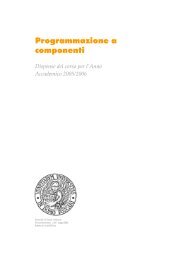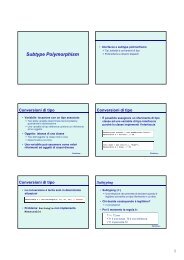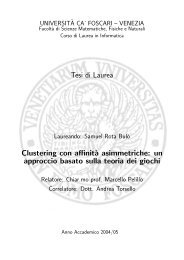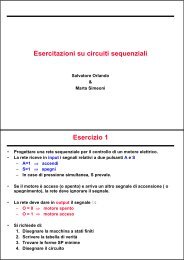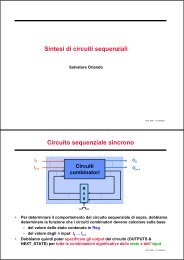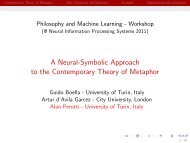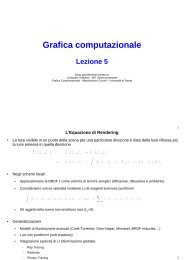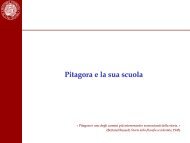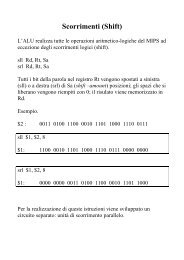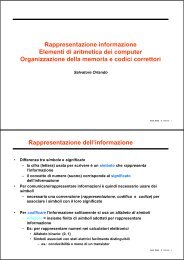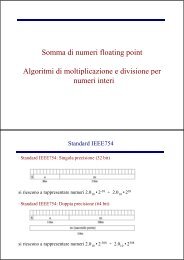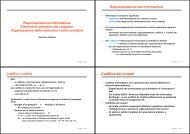Foscari - Dipartimento di Scienze Ambientali, Informatica e Statistica
Foscari - Dipartimento di Scienze Ambientali, Informatica e Statistica
Foscari - Dipartimento di Scienze Ambientali, Informatica e Statistica
Create successful ePaper yourself
Turn your PDF publications into a flip-book with our unique Google optimized e-Paper software.
10. leads / wires – _______________ (para 5)<br />
11. shows – _______________ (para 6)<br />
12. normal / or<strong>di</strong>nary – _______________ (para 7)<br />
13. no good / useless – _______________ (para 9)<br />
The future of design?<br />
Ian Sample, science correspondent<br />
November 24, 2007<br />
A Japanese innovator wants to change the face of shopping and replace mass-produced goods with<br />
people-power ideas<br />
If Kohei Nishiyama succeeds, he will be financially independent by the age of 40, living as an inventor<br />
and being woken each morning by his robot dog. The 37-year-old Tokyo-based designer and founder of<br />
Elephant Design has a dream, one he hopes will change the face of British shopping.<br />
He wants to empty the shelves of dreary, mass-marketed and mass-produced objects and replace them<br />
with products that we - the people - have helped to develop. Nishiyama calls his idea ‘Design to Order’<br />
and the principle is simple. Anyone with a unique idea, for anything from a robotic web camera to a<br />
magnetic bathroom mirror, posts an image and description on his website. There, people can log on to<br />
suggest alterations and improvements to the design. If enough people then vote for the product, he<br />
makes a deal with a manufacturer and the product is made.<br />
“There are so many mass-produced products making it on to the shelves because that’s how large<br />
companies do things. Our idea is to give people what they want by involving anyone of any age or<br />
nationality who has a good idea, early on in the process,” says Nishiyama.<br />
The scheme has been running in Japan for a few years, and has taken off among designers who use it to<br />
present their ideas instead of committing to something that may flop. The company has recently set up<br />
a test site with retailer Muji to help develop products for its stores. One idea, for transparent sticky<br />
memos, was suggested by a 21-year-old student and will be marketed next month. She will get royalties<br />
from every pack sold.<br />
Ahead of the formal UK launch next year, Nishiyama has appointed London-based designers The<br />
Division as its first British consultancy. The company has placed three designs on Nishiyama’s<br />
website: a clock that is vague about the time, a set of solar-powered, glowing garden furniture, and a<br />
wastepaper bin that ti<strong>di</strong>es ugly cables around work desks.<br />
David Tonge, founder of The Division, said: “We wanted a relaxed clock for the home, so the hour<br />
hand is on the outside, and like a sun<strong>di</strong>al it’s fairly vague. But in the centre, it <strong>di</strong>splays minutes in a<br />
<strong>di</strong>gital form so you can use it if you’re doing something like cooking pasta for 13 minutes.”<br />
The idea for the garden furniture came after Tonge was fed-up with the over-designed options he found<br />
in shops, while the cable ti<strong>di</strong>er is a standard paper bin fitted with a powerblock and cable storage<br />
compartments.<br />
Any item on the site that gets 1,000 votes is put forward for manufacture. As of yesterday, Tonge’s<br />
clock had received 39 votes, the cable ti<strong>di</strong>er 22 votes and the garden furniture nine. The lea<strong>di</strong>ng<br />
product on the site, with 235 votes, is a bathroom mirror that is also a whiteboard. The designers hope<br />
33



